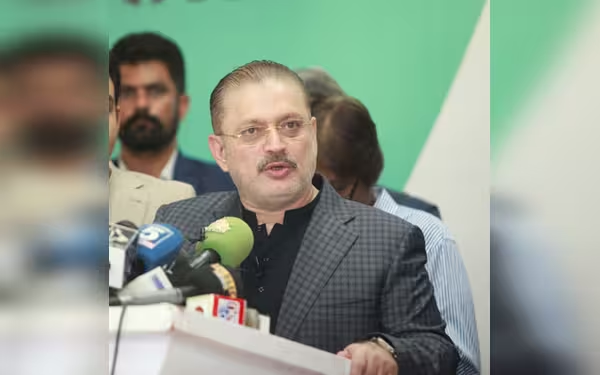Saturday, November 16, 2024 07:47 PM
PPP's Long-Standing Demand for Constitutional Courts, Says Sharjeel Memon
- PPP emphasizes need for constitutional courts in Pakistan.
- Sharjeel Memon criticizes former Chief Justices' legacies.
- Justice for Benazir Bhutto's murder case remains elusive.
 Image Credits: dailytimes_pk
Image Credits: dailytimes_pkSharjeel Memon highlights PPP's demand for constitutional courts and critiques the judicial system's failures in delivering justice.
The establishment of constitutional courts has been a long-standing demand of the Pakistan People’s Party (PPP), as emphasized by Sindh Senior Minister Sharjeel Inam Memon. This initiative dates back to the signing of the Charter of Democracy, where both the PPP and the Pakistan Muslim League-N (PML-N) agreed on the necessity of these courts. The implementation of this demand is now underway, reflecting the PPP's commitment to delivering justice swiftly and directly to the people.
During a recent media interaction, following the inauguration of the Pakistan Sustainability Week exhibition on alternative energy at the Expo Center in Karachi, Memon expressed his concerns regarding the prolonged wait for justice in the country. He lamented, "We still haven’t received justice for the murder of Shaheed Zulfikar Ali Bhutto," highlighting the deep-rooted issues within the judicial system. He described the assassination of Bhutto not merely as the loss of a political leader but as a significant blow to the nation’s future, interests, and democratic values.
Memon did not hold back in his criticism of former Chief Justices Iftikhar Chaudhry and Saqib Nisar, labeling them as a "disgrace" to the judicial system. He argued that their legacies should not be honored, and their privileges should be revoked. He further questioned Nisar's actions, asking, "Where in the Constitution does it state that building a dam was part of his responsibilities?" This pointed inquiry underscores the frustrations many feel regarding the judiciary's focus and priorities.
Reflecting on the delayed justice for the murder case of Shaheed Mohtarma Benazir Bhutto, Memon stated, "Is it not shameful that the courts of this country do not have time for the murder case of Shaheed Benazir Bhutto?" He contrasted this with the judiciary's attention to less significant cases, such as those involving the Nestlé Tower and the regularization of Bani Gala, questioning the values that guide judicial priorities.
Despite the challenges faced by the PPP, Memon reiterated the party's respect for the judiciary, stating, "Whether it is Chief Justice Qazi Faiz Isa or Justice Mansoor Ali Shah, both are respected by us." He emphasized that the PPP has endured significant hardships without attacking the judiciary, citing the lengthy imprisonment of former President Asif Ali Zardari as an example of their resilience.
In a broader context, Memon criticized the political landscape, particularly the actions of the Pakistan Tehreek-e-Insaf (PTI) founder, who he claimed has benefited from the judicial system while committing illegal acts. He pointed out the discrepancies in how different political figures are treated by the courts, stating, "The courts have granted PTI things they never even requested." This observation raises important questions about fairness and equality within the judicial process.
On a more positive note, Memon congratulated the organizers of the Pakistan Sustainability Week exhibition, highlighting the importance of alternative energy in addressing the country’s energy crisis. He noted that over 200 national and international companies participated, showcasing technologies that could help reduce the financial burden of electricity on the populace. Memon stated, "We aim to promote trade between Pakistan and other nations," emphasizing the potential economic benefits of such initiatives.
The establishment of constitutional courts is a significant step towards ensuring justice in Pakistan. However, the ongoing challenges within the judicial system highlight the need for reform and accountability. As the PPP continues to advocate for these changes, it is crucial for all stakeholders to prioritize the rule of law and the fair treatment of all citizens, ensuring that justice is not just a promise but a reality for everyone in the country.













